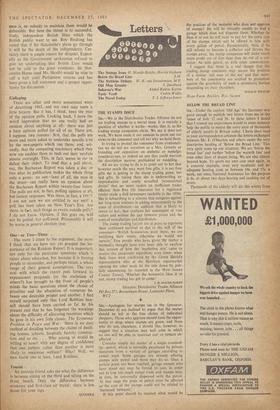SIR,—Apologists for stamps (as in the Spectator. December 6) are
inclined to argue that the matter should be left to the free choice of individual shoppers. Those who approve should have the oppor- tunity to shop where stamps are given, and those who do not, elsewhere, I should like, however, to suggest that a situation may well arise in which no one will be able to 'contract out' or remain un- affected.
Consider simply the matter of a single commod- ity—petrol, which is normally puzchased by private motorists from a variety of garages according to casual need. Some garages arc already offering stamps with petrol and more may do so. Once a certain point has been reached, garage owners who have stood out may be forced to join, in order not to lose too much casual trade and stamps may, in time, be universally • dispensed with the petrol. At that stage the price of petrol must be affected as the cost of the stamps could not be related to 'increased turngver: If this point should be reached what would be
the position of the motorist who does not approve of stamps? He will be virtually unable to find a garage which does not dispense them. Whether he likes it or not he will have to pay for the extra cost of the stamps which will be offered, to him with every gallon of petrol. Paradoxically, then, if he still refuses to become a collector and throws the stamps away, the stamp companies will make much more profit out of him than they do out of a col- lector. As with petrol, so with other commodities.
I suggest that there is a real danger that the trading stamp operators may secure the position of a sinister 'old man of the sea' and that mem- bers of the community are entitled to protection against the possibility of such a monstrous burden descending on, their shoulders.
Hope Farm. Beckley, Rye, Sussex
HAROLD INGHAM






























 Previous page
Previous page